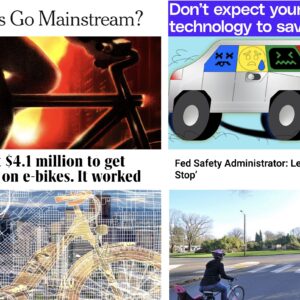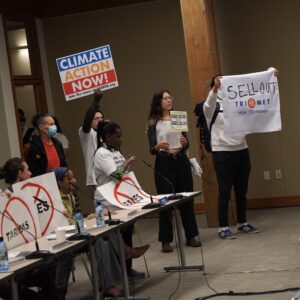Below is the full, prepared text of Karl Rohde’s testimony in front of the House Transportation Committee yesterday on behalf of the Idaho Stop law. Rohde is in charge of the BTA’s government affairs and he is their lobbyist in Salem.
(For a full report from that hearing, read our story from yesterday.)
Chair Beyer and Members of the Committee, thank you for the opportunity to appear before you today in support of House Bill 2690, the “Idaho Style Stop Law”. For the record, I am Karl Rohde, Government Relations and Public Affairs for the Bicycle Transportation Alliance.
The BTA firmly believes that this law is in the best interest of all users of the road. The BTA is committed to safety and would never support a bill that we felt might jeopardize someone’s safety.This bill does not decriminalize bad behavior, it decriminalizes good behavior, bad behavior would still be illegal and we will continue to work in collaboration with law enforcement to address the truly unsafe behavior that this law would not protect.
Most cyclists have a high degree of self-preservation and are not going to engage in unnecessarily dangerous behavior. By the very nature of the vehicle cyclists travel on, they have a higher degree of awareness of their surroundings. They sit up higher, they have no blind spots and they are not in an enclosed environment so their hearing is not affected. The letter from researcher Jason Meggs goes into greater detail on this.
The existing law, is a discouragement to cycling. Around 60% of the public are interested in cycling but have concerns for their safety and convenience. They would prefer to ride on low volume, low speed residential streets, however, in the interest of traffic calming, those streets are often loaded with stop signs to discourage automobiles from cutting through neighborhood streets. So the citizen choosing to bike to his or her destination is faced with a difficult choice—do I take the neighborhood street with all it’s stops and starts or do I move over to the high volume street will I can travel at a faster pace amongst all that traffic. Or, worse, do I accept that in order to get to my destination safely and conveniently, I’m just going to have to be an outlaw.
In our original concept of the bill, we had included a provision that would allow local jurisdictions to sign certain intersections that were determined to pose an extreme hazard with a required stop for bikes sign. We were contacted by Legislative Counsel and informed that because such a sign does not exist in the Manual on Uniform Traffic Control Devices, referencing it in legislation could not happen. We are still willing to entertain this concept and work with the Committee to address it.
Joining me to testify today are
Attorney Ray Mionskie
Attorney Ray Thomas
Corvallis Resident Kris Warloe
Chair of the BTA Legislative Committee, Doug Parrow [Parrow did not testify]The Bicycle Transportation Alliance is a statewide non-profit organization that works to open minds and roads to bicycling. We represent bicyclists and the bicycle industry with over 5000 members in Oregon and SW Washington, and have seventeen years of experience in bicycle engineering, planning, education and advocacy.



